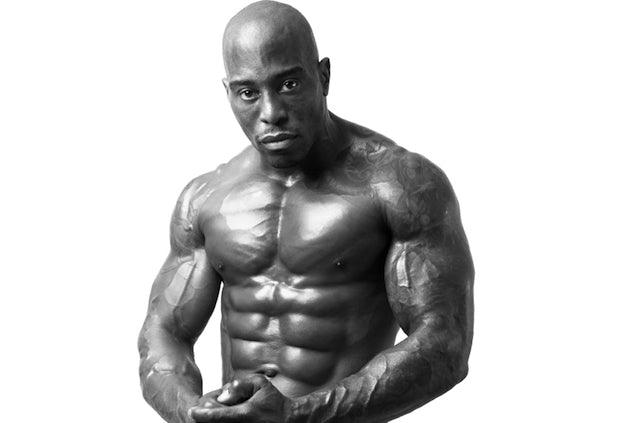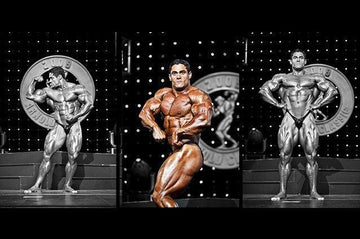

Shredded to the Bone: 5 Tips to Shred Bodyfat
Table of Contents
5 Body Fat Myths Busted
By Christian Finn
According to the Oxford English Dictionary, a myth is a “widely held but false notion” or a “fictitious person, thing, or idea.” A myth is like a virus, and can spread very quickly. Somebody says something, somebody repeats it, and then you repeat it. Suddenly, it’s become a fact. Writers will often regurgitate each other’s mistaken facts rather than invest the time and effort necessary to dive into the research and get the facts for themselves.

Myth 1: Interval training works better than steady-state cardio for fat loss
Some say that steady-state cardio will rob you of your hard-earned muscle and sabotage your attempts to get lean. The solution, they claim, is to do interval training instead. It’s true that there are a handful of published studies to show that interval training leads to a faster rate of fat loss than steady-state cardio . But there is also research out there to show the exact opposite; that steady-state cardio leads to more fat being lost than interval training .
Telling people about the research that supports your point of view while ignoring the rest is known as cherry picking. It’s a little like reviewing a movie based on the trailer alone – you’re only seeing the good stuff, and the impression you come away with is based on an extremely limited amount of information. By itself, low-intensity steady-state cardio is not a particularly effective way to drop the pounds. But it’s important to remember that steady-state cardio is an umbrella term that can refer to many different forms of exercise, ranging in intensity from low to medium to high.
Lumping them all in the same category ignores the fact that 30 minutes of coasting along on the elliptical machine while watching TV and sending text messages requires substantially less energy than the same amount of time spent cycling up a steep hill as fast as humanly possible. Both are forms of steady-state cardio. But the latter is going to burn a lot more calories than the former.
There are many different ways to do cardio. All of them have their place at different times and for different people. Think of interval training as a tool in the box, rather than the magic bullet that some are claiming.
Myth 2: Sugar makes you fat
Some say that sugar will make you fat, weak and depressed faster than Samson losing his strength after a visit to the barber’s.
But is it really that bad?
When total calorie intake is matched, most human studies show little difference in weight loss with a diet containing lots of sugar compared to one containing almost no sugar at all.
In one trial, researchers from Duke University Medical Center found no significant difference in the rate of weight loss with low sugar (4% of total calories from sucrose) versus high sugar (43% of total calories from sucrose) diets .
In a review published in the American Journal of Clinical Nutrition, Dutch researcher Wim Saris looked at a number of different studies on the subject of sugar and weight control .
His conclusion?
“These weight-loss studies with different types and amounts of carbohydrates including high and low sucrose do not indicate that weight loss is impaired by high-sucrose, energy-restricted diets.”
If you want to lose fat, eating less of the food that you know isn’t doing you any good – cakes, cookies, chocolate bars, ice cream and so on – is a step in the right direction. But that’s not because there is one single nutrient in there that’s making you fat. It’s because cakes, cookies, chocolate bars, and ice cream taste very nice. They’re an extremely easy and highly enjoyable way to provide your body with more energy than it needs – energy that will eventually end up stored as fat.
Contrary to what the “zero sugar” brigade might tell you, eating less sugar doesn’t have to mean eating no sugar at all. Sugar does not make you fat. Putting sugar in your coffee is not going to stop you from losing weight. As long as you account for it in your daily carbohydrate budget, including some sugar in your diet isn’t going to have a big impact on your results.
Myth 3: Body fat scales tell you how much fat you’re losing.
The main selling point of a body fat scale is its ability to accurately monitor the impact of your diet and training program. Is what you’re doing working, or are you just wasting your time?
Unfortunately, much of the data they churn out is highly unreliable. Body fat scales use a method known as bioelectrical impedance to estimate your body composition. They run a light electrical current through your body, measure the degree of resistance to the flow of the current, and then use this information to estimate how much body fat you’re carrying around.
Perhaps the most obvious limitation with a body fat scale is that it will miss out large segments of your body. Stand on a set of foot-to-foot body fat scales and the current will simply go up one leg and down the other. So you’re really only measuring how fat your legs are. Even with devices that place electrodes on your hands and feet, the results are not particularly accurate.
In one study that looked at changes in body composition in a group of male bodybuilders, researchers compared several body fat tests with something called the 4-compartment model, which is currently the “gold standard” when it comes to predicting body composition .
Bioelectrical impedance was the least accurate of all the methods, with a margin of error as high as 8%. That means you could train hard and diet for a month or two and lose 4% body fat. But bioelectrical impedance might show that your body fat went UP by 4%.
Body fat tests are less of a measurement than they are a prediction. And just like the predictions from economists, football pundits and stock market analysts, many will turn out to be wrong.
Myth 4: The key to weight loss is to control your insulin levels.
You’ll read a lot about insulin “turning off” the fat-burning switch, and that you won’t make any progress if your insulin levels are “out of whack.”

It’s true that insulin has an important role to play in fat metabolism. However, claims that high levels of insulin make you store fat no matter how many calories you eat, or that you can eat as much protein and fat as you want without gaining weight, are grounded more in science fiction than science fact.
When you eat a food high in protein (such as beef or whey protein, for example), insulin levels will rise. That’s despite the fact that blood sugar levels stay pretty much the same. In fact, some protein-rich foods have been shown to raise insulin levels to a greater extent than their high-carbohydrate counterparts. Research also shows that it’s possible to lose fat with widely varying levels of insulin.
In one study, Australian researchers took a group of overweight or obese subjects and put them on one of three different diets — low carbohydrate, low fat and high unsaturated fat . The low carbohydrate diet led to a 33% drop in insulin levels. There was a 19% fall on the high unsaturated fat diet and no change on the low fat diet.
If insulin was really so important when it comes to getting lean, you’d expect to see the group with the lowest insulin levels losing the most fat, and the group with the highest levels of insulin losing the least fat. But that’s not what happened. Despite the variation in insulin levels, there was no significant difference in the rate of fat loss on all three diets.

Myth 5: Eating late at night stops you from losing fat.
You’ve heard it said that you should eat breakfast like a king, lunch like a prince, and dinner like a pauper. Calories, especially those coming from carbohydrates, are supposed to be more fattening when they’re eaten at night.
Yes, there is research to show that people eating a large breakfast and small dinner lose weight faster than those eating a small breakfast and large dinner . But there’s also research showing the exact opposite – that people who eat larger meals later in the day lose more weight when they’re dieting .
You can drop fat with a wide variety of diets and meal timing patterns, but it’s your ability to stick to the diet that’s more important than anything else. If you find that the conventional “large breakfast and small dinner” advice leaves you hungry, try doing it the other way around. It’s up to you to choose the method that fits you and your lifestyle. There’s no strong evidence to suggest that either dietary strategy delivers vastly superior results.
References
1. Noakes M, Foster PR, Keogh JB, James AP, Mamo JC, Clifton PM. (2006). Comparison of isocaloric very low carbohydrate/high saturated fat and high carbohydrate/low saturated fat diets on body composition and cardiovascular risk. Nutrition & Metabolism, 11, 3:7
2. Keating, S.E., Machan, E.A.,O’Connor, H.T., Gerofi, J.A., Sainsbury, A., Caterson, I.D., Johnson, N.A. (2014). Continuous Exercise but Not High Intensity Interval Training Improves Fat Distribution in Overweight Adults. Journal of Obesity, 2014
3. Surwit RS, Feinglos MN, McCaskill CC, Clay SL, Babyak MA, Brownlow BS, Plaisted CS, Lin PH. (1997). Metabolic and behavioral effects of a high-sucrose diet during weight loss. American Journal of Clinical Nutrition, 65, 908-915
4. Saris WH. (2003). Sugars, energy metabolism, and body weight control. American Journal of Clinical Nutrition, 78, 850S-857S
5. van Marken Lichtenbelt WD, Hartgens F, Vollaard NB, Ebbing S, Kuipers H. (2004). Body composition changes in bodybuilders: a method comparison. Medicine and Science in Sports and Exercise, 36, 490-497
6. Jakubowicz D, Barnea M, Wainstein J, Froy O. (2013). High caloric intake at breakfast vs. dinner differentially influences weight loss of overweight and obese women. Obesity, 21, 2504-2512
7. Sofer S, Eliraz A, Kaplan S, Voet H, Fink G, Kima T, Madar Z. (2011). Greater weight loss and hormonal changes after 6 months diet with carbohydrates eaten mostly at dinner. Obesity, 19, 2006-2014
8. Trapp, E.G., Chisholm, D.J., Freund, J., & Boutcher, S.H. (2008). The effects of high-intensity intermittent exercise training on fat loss and fasting insulin levels of young women. International Journal of Obesity, 32, 684-691

















